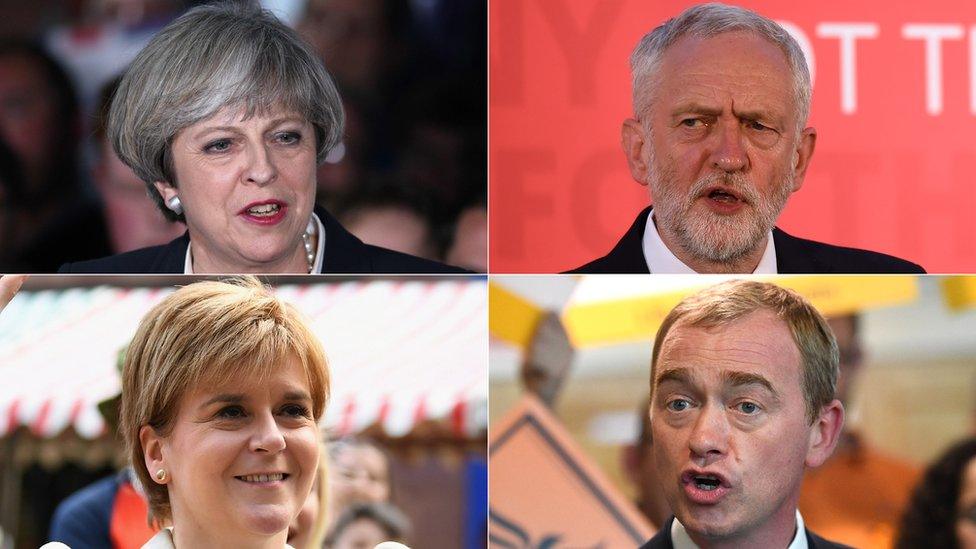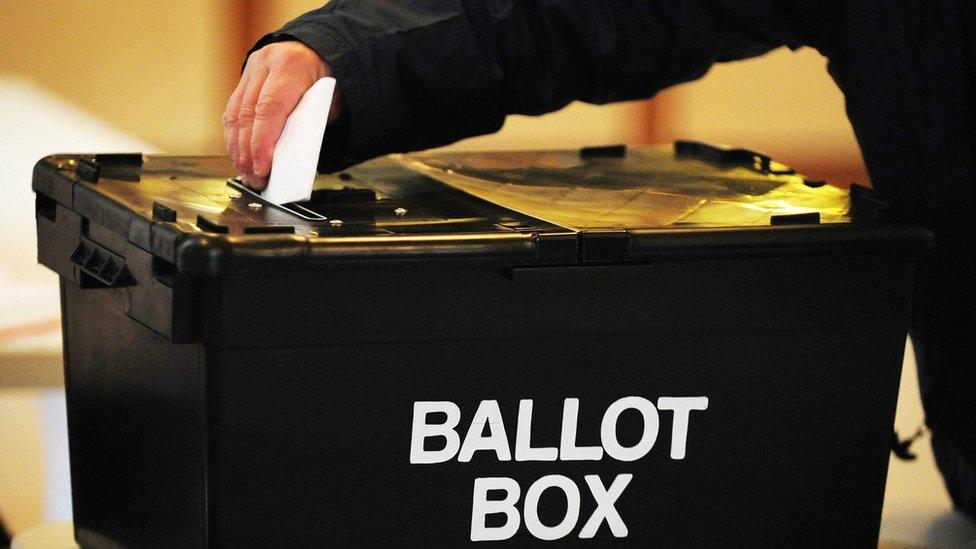General election 2017: Making sense of the final polls
- Published

Confused about what is likely to happen on Thursday?
That would not be surprising. The polls have, after all, produced very divergent results.
In the last few days, for example, one has put the Conservative lead over Labour as low as one point and another as high as 12.
So how should you try and make sense of the final polls as they appear on Wednesday and Thursday? And what should you look out for as the results themselves are eventually declared on Thursday night?
There is one crucial statistic to keep in your mind in the next few days.
At the last election in 2015 the Conservatives were seven points ahead of Labour in the national vote and that secured them an overall majority of 12.
So, any poll that puts the Conservative lead at six points or less is suggesting that the Conservatives will be less far ahead of Labour than two years ago - and, consequently, could potentially be at risk of losing their overall majority.
Conversely, any poll that reckons the Conservatives are ahead by eight points or more implies that the party is likely to make gains from Labour and thus increase its majority.
What this means is that, at the moment at least, some polls are pointing towards the Conservative lead narrowing as compared with 2015 while others suggest that it will be bigger.
Meanwhile, on average, they point to the same seven-point lead that the Tories won two years ago.
Little wonder that the outcome of the election looks uncertain.
Exit poll
Also worth keeping an eye on are polls about what will happen in Scotland, where the SNP won 56 out of 59 seats last time.
That remarkable feat will be difficult for the nationalists to repeat.
Both the polls and recent devolved and local election results suggest there has been something of a Conservative revival north of the border - which could deliver the party potentially vital extra seats at the expense of the SNP.
But what about the night itself? What should you look out for then?

The first intimation of the result will come from an exit poll jointly commissioned by the BBC, ITV, and Sky. Interviewers from GFK and Ipsos MORI will be approaching voters outside 144 polling stations across the length and breadth of Britain and asking them to indicate on a mock ballot paper which way they have just voted.
Analysed by a team of election experts, the data will provide the basis for making an estimate of how many seats each party will win.
Do not expect this estimate to be exactly right!
However, the record of the exit poll at the last three elections suggests it should give a good indication of what roughly the result will be.
Just an hour or so later, we should get the first result - from Houghton and Sunderland South, where the local council prides itself in always being the first to declare.
It is a safe Labour seat, and so should not change hands. But it will be the first indication of whether the exit poll is at least roughly right or not.
That is because the poll produces an estimate of the likely outcome in every single seat.
Marginal questions
So in the early part of the night we can compare the actual result with what the exit poll forecast it would be.
By 01:00 we should have around a dozen results, and they should give us a good idea of whether the poll is broadly right - or not.
If it is not right, expect a new forecast to appear at around this point.
But, of course, the outcome will eventually be settled in the marginal seats, that is the seats where the result last time was close, and which are thus most likely to change hands.
So far as Labour-held marginals are concerned, keep an eye out for Tooting and Wrexham, expected to declare at 01:30 or so.
If the Conservatives win either of these it could well be an indication that Theresa May is on course to increase her majority quite substantially.
If Darlington were to be won by the Conservatives, then her hopes of winning a landslide could be set to be fulfilled.
The first Conservative-held marginals - Bury North and Thurrock - are not expected until a little later at around 02:00.
If the Conservatives were to lose either of these it could be a sign that the party is at risk of losing its majority.
Meanwhile, by this time the first results from Scotland should start to come in, giving us an idea of the likely shape of the very different but potentially important battle there.
After that expect a flood of results.
The BBC's forecast of the outcome in seats will be periodically updated to help make sense of the direction in which the election is headed.
But as to when it will be safe to go to bed clear (rather than confused) about who has won, that depends on whether the result is close - or not!
John Curtice is Professor of Politics at Strathclyde University
- Published19 December 2017
